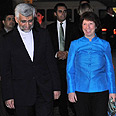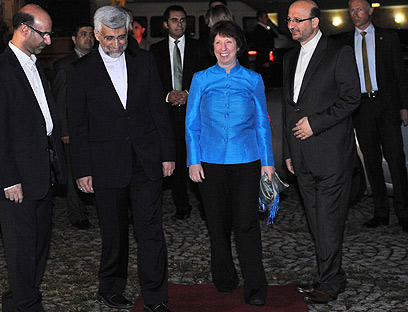
Bahrain, UAE probe suspicious shipments headed to Iran
Gulf nations confiscate items Iran may have sought for its nuclear program, in a development diplomats claim shows sanctions' success
Bahrain and the United Arab Emirates have confiscated a number of items Iran may have sought for its nuclear program, a development that diplomats said showed how enforcement of UN sanctions against Tehran is steadily improving.
One of the items heading to Iran but confiscated by Bahrain was carbon fiber, the diplomats told Reuters, a dual-use material UN experts have said would be crucial if Iran was to develop more advanced nuclear enrichment centrifuge technology.
Related stories:
- Lavrov: US sanctions harming Russian business
- Iran says oil exports unaffected by sanctions
- EU, Iranian nuclear negotiators to meet
Meanwhile, EU foreign policy chief Catherine Ashton on Tuesday held her first face-to-face meeting since June with Iran's top nuclear negotiator Saeed Jalili, in a bid to get international talks over Tehran's disputed atomic program restarted.
No statements were made to the press at the beginning of the meeting which was held behind closed doors at the Iranian consulate in the Turkish city of Istanbul.

Ashton and Jalili in Turkey (Photo: AFP)
Bahrain's and UAE's confidential reports to the UN Security Council's Iran sanctions committee are politically significant, envoys said on condition of anonymity, since they highlight how more and more states are enforcing the sanctions and making it increasingly difficult for Tehran to flout them.
"The fact that these two countries are now taking steps to enforce the sanctions and reporting those steps to the UN is remarkable by itself," a senior Security Council diplomat told Reuters. "It shows that the UN sanctions regime can work. UAE has been one of Iran's enablers. Iran's becoming more isolated."
The emirate Dubai has long been one of Iran's main transit hubs because of its busy port and position as a key financial center. The Carnegie Endowment for International Peace think-tank wrote in July 2011 that Dubai was "a top source of Iranian imports and a key transshipment point for goods - legal and illegal - destined for the Islamic Republic."
UAE officials insist that the country's policy has always been to fully abide by UN regulations and cooperate with the sanctions committee. A UAE official who declined to be identified played down the reports to the Iran committee.
"All incidents were reported at the time when they happened, and there has been no incident in more than a year," the official told Reuters. He did not comment further.
Bahrain's mission to the United Nations in New York did not reply to a request for comment, and officials in Bahrain were not immediately available to comment.
Carbon fiber
Bahrain has become increasingly annoyed with what it says are attempts by Iran to undermine its government. The Sunni-led island, along with fellow Gulf Arab countries, have accused Shiite-led Ira n of being behind the unrest in the region. Tehran denies fomenting problems in Bahrain.
UN diplomats say that some countries could also do more to enforce the sanctions. They say it is important for China, Russia, India, Turkey and others to counter Iranian attempts to use their territory to circumvent international sanctions.
The UAE reported to the council's Iran sanctions committee that it had made some 15 interceptions of suspicious items bound for Iran over the last three years, diplomats said.
"Some of those items have been cleared as OK but some remain under investigation," a UN diplomatic source told Reuters.
Diplomats said that reports from the UAE, Bahrain and other countries would likely be mentioned in a briefing later this week for the 15-nation council by Colombia's UN envoy Nestor Osorio, who chairs the Iran sanctions committee.
Osorio's report was expected to leave out the names of the countries that submitted reports to the committee in keeping with council tradition on such delicate matters, envoys said.
In some cases, the UAE returned seized items to the original shipping countries, diplomats said. Among the firms involved in the procurement efforts the UAE uncovered was Kalaye Electric Co. in Tehran, the former center of Iran's enrichment centrifuge research and development program, envoys said.
There were no details available on the items confiscated by UAE authorities, but the three items Bahrain intercepted included carbon fiber, a dual-use material that the UN expert panel identified in a May 2012 report as key for the further development of Iran's uranium enrichment centrifuge program.
It remains unclear if Iran wanted the carbon fiber for its nuclear program, diplomats said.
AFP contributed to this report
- Receive Ynetnews updates directly to your desktop










